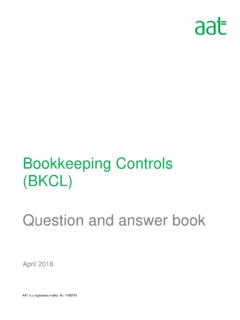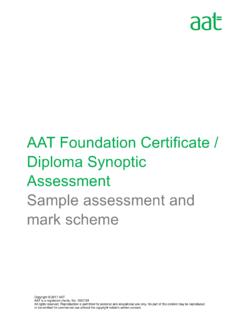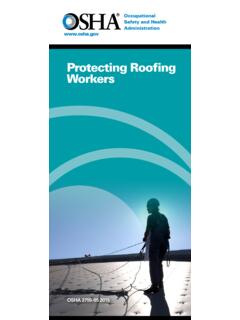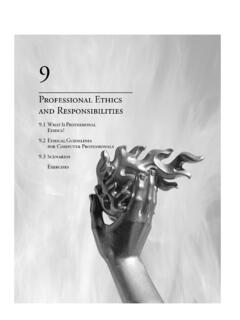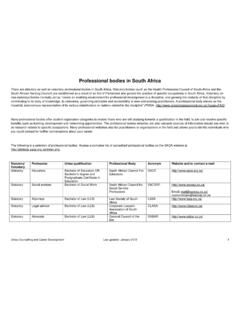Transcription of AAT Code Professional Ethics - Association of Accounting ...
1 AAT is a registered charity. No. 1050724 Code of Professional Ethics AAT is a registered charity. No. 1050724 2 Contents Foreword .. 3 4 Glossary of Terms .. 6 Part A. General Application of the Code .. 11 Section 100. Introduction and Code of fundamental principles .. 11 Section 110. Integrity .. 16 Section 120. Objectivity .. 17 Section 130. Professional competence and due care .. 18 Section 140. Confidentiality .. 19 Section 150. Professional behaviour .. 21 Section 160. Taxation .. 22 Part B. Licensed members .. 24 Section 200. Introduction .. 24 Section 210. Professional appointment .. 29 Section 220. Conflicts of interest .. 33 Section 225. Responding to Non-Compliance with Laws and Regulations .. 37 Section 230. Second opinions .. 44 Section 240. Fees and other types of remuneration .. 45 Section 250. Marketing Professional services.
2 47 Section 260. Gifts and hospitality .. 48 Section 270. Custody of client assets .. 49 Section 280. Objectivity all services .. 50 Section 290. Independence review and assurance engagements .. 51 Part C. Members in business .. 53 Section 300. Introduction .. 53 Section 310. Conflicts of interest .. 56 Section 320. Preparation and reporting of information .. 58 Section 330. Acting with sufficient expertise .. 59 Section 340. Financial interests, compensation and incentives linked to financial reporting and decision-making .. 60 Section 350. Inducements .. 62 Section 360. Responding to Non-Compliance with Laws and Regulations .. 64 AAT is a registered charity. No. 1050724 3 Foreword Being a member of AAT is more than a qualification. AAT is well recognised and respected throughout a wide range of businesses and, in order to maintain this reputation and to continue to offer quality training and support, we require our members to have a Professional and ethical approach throughout their lives.
3 It is because of our exceptionally high standards, quality training and the professionalism of our members that we are so highly regarded. This is a benefit to us as an Association and to you as a member. To help our members maintain these standards and offer the highest levels of Professional service at all times, we publish the AAT Code of Professional Ethics which set out a Code of fundamental ethical principles and supporting guidance. The decisions you make in the everyday course of your Professional lives can have real ethical implications. This is where the Code helps. The Code: x sets out the required standards of Professional behaviour with guidance to help you achieve them x helps you to protect the public interest x helps you to maintain AAT's good reputation. AAT is a registered charity. No. 1050724 4 Introduction This Code was revised in 2017, and approved by AAT Council, to come into force on 15 July 2017.
4 It is based on the Code of Ethics for Professional Accountants approved by International Ethics Standards Board for Accountants (IESBA) which came into force on 1 January 2011. A number of revisions were made to this Code since, and these have been incorporated by AAT. AAT is a full member of IFAC. The mission of IFAC, as set out in its constitution, is the worldwide development and enhancement of an accountancy profession with harmonised standards, able to provide services of consistently high quality in the public interest. In pursuing this mission, the IFAC Board has established IESBA to develop and issue, under its own authority, high quality ethical standards and other pronouncements for members for use around the world. The IESBA Code of Ethics on which this Code is based establishes ethical requirements for IFAC members.
5 In keeping with the IESBA Code, this Code adopts a principles-based approach. It does not attempt to cover every situation where a member may encounter Professional ethical issues, prescribing the way in which he or she should respond. Instead, it adopts a value system, focusing on fundamental Professional and ethical principles which are at the heart of proper Professional behaviour and which members must therefore follow. To supplement this, the Code also provides detailed guidance of specific relevance to AAT members to help ensure that they follow the fundamental principles both in word and in spirit in all of their Professional activities. This Code therefore: x sets out a Code of five fundamental principles which members must follow: -integrity-objectivity- Professional competence and due care-confidentiality- Professional provides a conceptual framework which members must apply to enable them to identify and evaluate threats to compliance with the fundamental principles and to respond appropriately to them x provides guidance and illustrations on how to apply the conceptual framework in practice both generally and in specific problem situations.
6 Members should consider these and apply them as appropriate to ensure that they adhere to the fundamental principles in their own situation. The Code is in three parts: x Part A applies to all members. x Part B represents additional guidance which applies specifically to Licensed members. x Part C applies specifically to members in business. See the definitions of Licensed member and member in business in the glossary of terms below. AAT is a registered charity. No. 1050724 5 Three key words are used throughout this document to guide members in the action needed in order to comply with the fundamental principles: x The word consider is used when members are required to think about several matters. x The word evaluate is used when members are required to think about several matters and assess the positive and negative elements.
7 X The word determine is used when members are required to conclude and make a decision. The Code is based on the laws effective in the UK which members are expected to comply with as a minimum requirement. Members wor king or living overseas are expected to know and apply the laws of the overseas country, having taken local legal advice if necessary. Where this Code refers to legal issues, it does not purport to give definitive legal advice or to cover every situation, nor does this Code highlight every legal issue that members may need to consider. Members who encounter problems in relation to legal aspects are recommended to seek their own legal advice. There may be occasions when members, whether having sought independent advice or not, and having considered the application of the Code of Professional Ethics in a particular situation, are still in doubt about the proper course of action to be taken.
8 In such cases they should contact the Ethics Advice line on: +44 (0)20 7397 3014 or giving all the relevant facts. Members should note that misconduct is defined as Professional or personal conduct, in breach of the Code of Professional Ethics , which poses a risk to the public or is likely to undermine public confidence in the Association or its members . It is expected that members are familiar with the requirements of this Code. Members should note that where they are also a member of another Professional or regulatory body which is a member of a chartered or certified accountancy body, there may be differences in some areas between the Professional and ethical conduct requirements of the different bodies. Where there are differences, members should follow the more stringent provision and must do so where the more stringent provision is an AAT requirement.
9 The accountancy profession, including the part represented by AAT members, is committed to the following objectives: x the mastering of particular skills and techniques acquired through learning and education and maintained through continuing Professional development x development of an ethical approach to work as well as to employers and clients. This is acquired by experience and Professional supervision under training and is safeguarded by strict ethical and disciplinary Codes. x acknowledgement of duties to society as a whole in addition to duties to the employer or the client x an outlook which is essentially objective, obtained by being fair minded and free from conflicts of interest x rendering services to the highest standards of conduct and performance x achieving acceptance by the public that members provide accountancy services in accordance with these high standards and requirements.
10 This Code aims to assist members to achieve these objectives. AAT is a registered charity. No. 1050724 6 Glossary of Terms In the AAT Code of Professional Ethics for members, the following expressions have the following meanings assigned to them: AAT Advertising Anti-money laundering legislation Associate Association of Accounting Technicians The communication to the public of information as to the services or skills provided by Licensed members with a view to procuring Professional business. The Proceeds of Crime Act 2002 (as amended), the Terrorism Act 2000 (as amended), the Money Laundering Regulations (as amended), related statutory instruments and any amending or superseding legislation. Business partner or colleague Assurance client The responsible party that is the person (or persons) who: x in a direct reporting engagement, is responsible for the subject matter or x in an assertion-based engagement, is responsible for the subject matter information and may be responsible for the subject matter.







